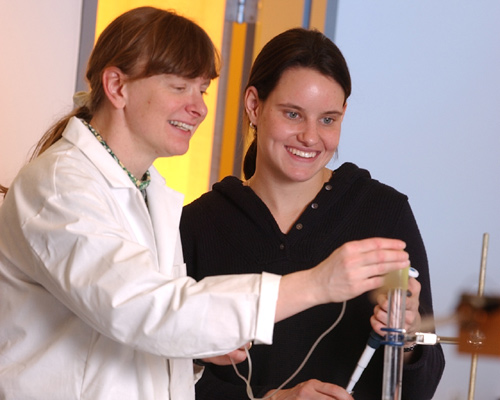Trustee Scholarship recipient Meghan Ramsey ’04 conducted research last summer that may help increase the understanding of what causes many neurological diseases.
Selected from among Lafayette’s top applicants, Trustee Scholars have distinguished themselves through exceptional academic achievement in high school. They receive from Lafayette an annual minimum scholarship of $7,500 (totaling $30,000 over four years) or a grant in the full amount of their demonstrated need if the need is more than $7,500.
Ramsey, a neuroscience major and varsity soccer standout, investigated improper folding of proteins as an EXCEL Scholar with Yvonne Gindt, assistant professor of chemistry. In Lafayette’s EXCEL Scholars program, students assist faculty with research while earning a stipend.
Describing her project, Ramsey explains that “proteins have several different levels of structure. How a protein is structured and how it interacts with itself is very important to its function. I looked at different factors that affect protein folding and stability. This project was very exciting because proteins are essential components of organisms, including humans. If protein structure can be better understood, then it may open doors to understanding diseases that result from proteins that do not fold properly.”
Gindt says, “Meghan has a large advantage over many of her peers because she has both a chemist’s and a neuroscientist’s perspective. The project gave her good grasp of the tools used by the physical scientists to study this problem.”
“We worked on one facet of a larger project on protein oligomerization, which is the formation of an active protein structure from different subunits,” Gindt continues. “Many proteins only work if they have their subunits assembled in the correct manner. We studied the kinetics and thermodynamics of such an assembly using a protein that changes color when the subunits are assembled properly.”
Gindt explains that the oligomerization process is necessary for the formation of active proteins. For example, the hemoglobin in red blood cells will only work properly if all four subunits are assembled correctly to form the active hemoglobin molecule. Also, oligomerization competes with protein aggregation, which is the process whereby protein subunits clump together to form large, insoluble clumps.
“Protein aggregation either is a symptom or underlying cause of some very serious diseases, including Alzheimer’s, Parkinson’s, and diabetes mellitus,” says Gindt. “We need to understand how aggregation occurs and how to prevent or reverse it. It appears that many neurological diseases are related to protein misfolding or clumping. A multidisciplinary approach is required to create therapies for these complicated diseases.”
Ramsey says she learned so much while conducting this research that she feels like a completely different person.
“I refined my lab skills, which has helped me in many of my courses,” she says. “Also, I learned to analyze data using a computer program called Igor. I learned how to use ultraviolet visible spectroscopy fairly efficiently. Dr. Gindt taught me a great deal.”
Ramsey worked with Gindt on another project during the spring semester and was a student in her general chemistry course during fall semester.
“When Dr. Gindt asked me to stay for the summer, I felt that it was a great opportunity,” she says. “I thought that I could learn a great deal by working with her and it may help direct me toward my career goals. Also, Lafayette makes the opportunity attractive by providing housing.”
On most days, Ramsey arrived at the lab at 8 a.m. and left between 3 and 6 p.m. Gindt says that Ramsey is unusually independent for someone at this stage in her career. “I do not think that I would have an opportunity to do research like this at many schools,” adds Ramsey.
A midfielder on Lafayette’s varsity soccer team, Ramsey started every game during her first two years. This year both the women’s and men’s soccer teams were honored for academic excellence by the National Soccer Coaches Association of America. Lafayette was one of just 12 Division I institutions whose men’s and women’s soccer programs each had a team GPA of 3.0 or above. Long at the forefront for academic honors in the Patriot League, Lafayette was the only league school to have both programs recognized. It is the fourth straight season that the women’s soccer program has received the honor from the coaches association.
Ramsey is a supervisor for the student phonathon and a 2002-03 Lafayette Leadership intern. She has served as a volunteer soccer coach at the YMCA.

Goldwater Scholarship. Meghan Ramsey ’04 received a Goldwater Scholarship, premier national undergraduate award in math, science, and engineering, and was a Rhodes Scholar candidate. One of her mentors is Yvonne Gindt, asst. professor of chemistry.
